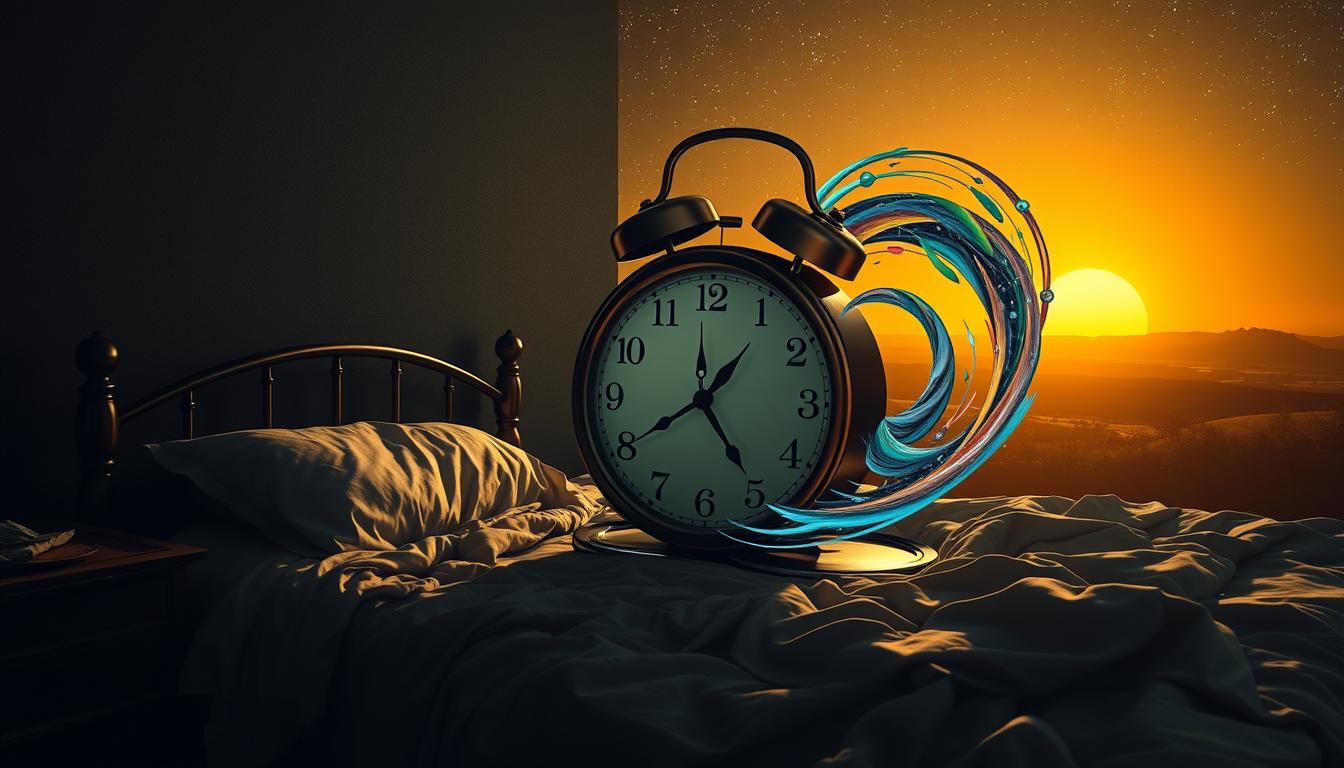Your body has an internal clock that controls when you feel awake and tired. A circadian rhythm disorder can mess with your sleep patterns. This makes you feel very tired.
Changes in your natural rhythms can affect your mood and focus. Learning about circadian rhythm disorder helps you follow daylight and nighttime cycles. This can make your sleep better and improve your overall well-being.
Understanding Circadian Rhythm Disorders
Our bodies have internal clocks that help us follow daily routines. Daylight tells us when to rest or stay awake. When these cycles get out of sync, life can feel off balance.
Scientists at the Mayo Clinic say it’s key to tune into these rhythms early. Keeping them in sync helps us stay well and avoid sleep problems.
What Are Circadian Rhythms?
They are biological processes that run on a 24-hour cycle. Hormones and body temperature change in sync with these rhythms. Sunlight tells our brain to reset each morning, while darkness helps us sleep.
This cycle affects our mood, alertness, and more. It’s crucial for our overall health.
Common Types of Circadian Rhythm Disorders
Some people have trouble sleeping at the right time. This can lead to tired days and poor performance. Experts suggest getting checked early to avoid these issues.
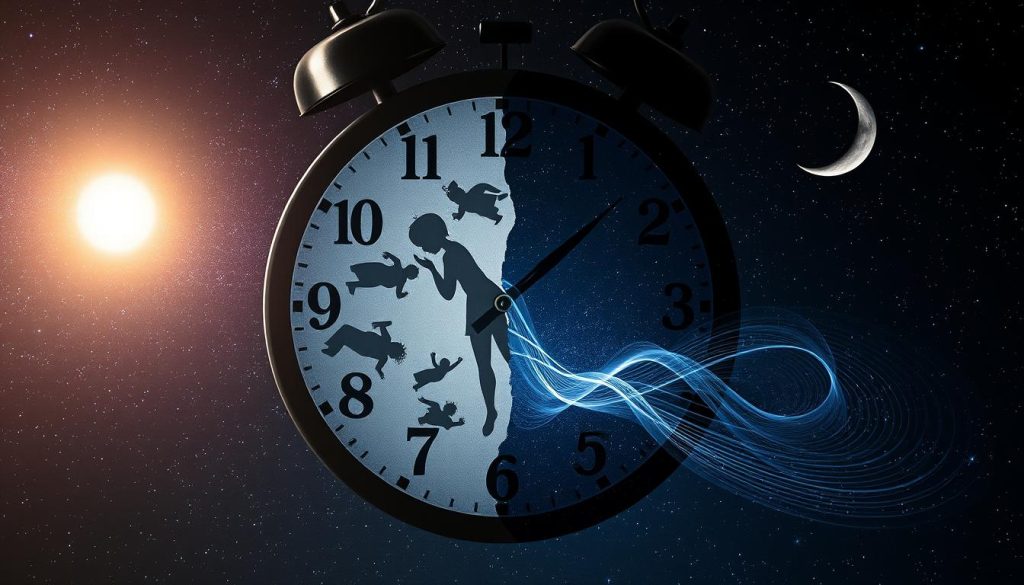
| Disorder | Key Feature | Possible Impact |
|---|---|---|
| Delayed Sleep Phase | Bedtime pushed far past midnight | Morning drowsiness, late-night energy |
| Advanced Sleep Phase | Early bedtime with pre-dawn awakenings | Lack of rest when rising too soon |
| Irregular Rhythm | Scattered rest periods instead of solid blocks | Chronic tiredness, difficulty focusing |
Signs and Symptoms to Watch For
Many people find it hard to spot signs of sleep trouble. It happens when staying up late clashes with early morning duties. This can lead to feeling tired, irritable, and mood swings.
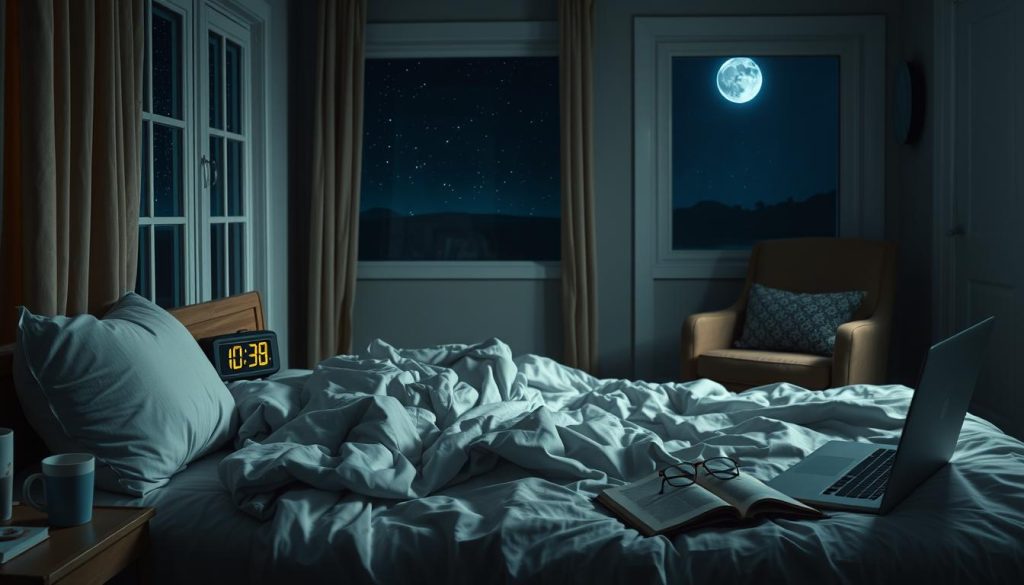
Identifying Key Symptoms
Changes in sleep and wake times are often the first signs. Feeling awake at night but tired in the day is common. Yawning a lot and dozing off in important meetings or classes might mean you have delayed sleep phase syndrome.
Having trouble starting your day on time could mean your body clock is out of sync.
Behavioral Indicators of Disorders
Those dealing with these issues might feel restless and struggle to focus. Being late to work or school is a big red flag. Changes in appetite or wanting to stay away from people are also signs.
Spotting these signs is a chance to take action and get your sleep back on track.
Causes of Circadian Rhythm Disruptions
Everyday habits often cause lasting problems. Devices that give off blue light keep our minds awake too long. Traveling across time zones also messes with our body’s clock. These issues can lead to symptoms similar to advanced sleep phase syndrome.
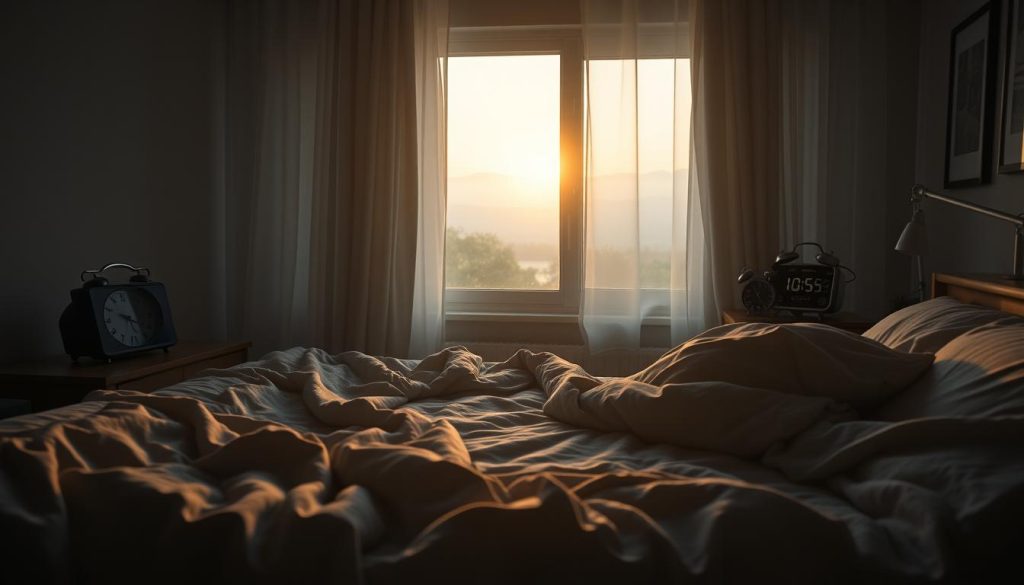
Work schedules that are too demanding can disrupt our sleep. This can make us feel tired at the wrong times. It’s because our body’s natural rhythm gets out of sync.
Environmental Factors
Bright lights and irregular daylight can affect our sleep patterns. Working at odd hours makes it hard for our body to rest. And, seasonal changes can also mess with our sleep-wake cycle.
Genetic Influences
Some people are more likely to have unusual sleep patterns because of their genes. If you’re prone to advanced sleep phase syndrome, it’s because of your genes and the environment. It’s a mix of biology and environment that can make it hard to manage your sleep.
The Impact of Sleep on Circadian Rhythms
Sleep is key for our daily cycles. It resets our body, balances hormones, and boosts mental clarity. Regular sleep keeps our internal clock in sync with the world around us.

Keeping a regular sleep schedule can be tough. Disruptions or certain disorders can mess with our natural rhythm.
Sleep Stages Explained
Every night, our brain goes through light, deep, and REM sleep. Light sleep starts the cycle, moving us into deeper phases. Deep sleep fixes muscles and tissues. REM sleep helps with memory and dreams.
- Light Sleep: Eases the body into slumber
- Deep Sleep: Allows physical restoration
- REM: Boosts mental processing
How Sleep Disorders Fit In
Disorders like non-24-hour sleep-wake disorder can disrupt our rhythm. They change our sleep and wake times. This unpredictability can hurt our thinking and mood.
Staying on a stable schedule helps. It improves our daytime performance and overall health.
Diagnosing Circadian Rhythm Disorders
Finding out why sleep patterns change is key. Doctors look at personal health to find hidden causes. Signs like feeling very tired during the day or being awake at odd times point to possible issues.
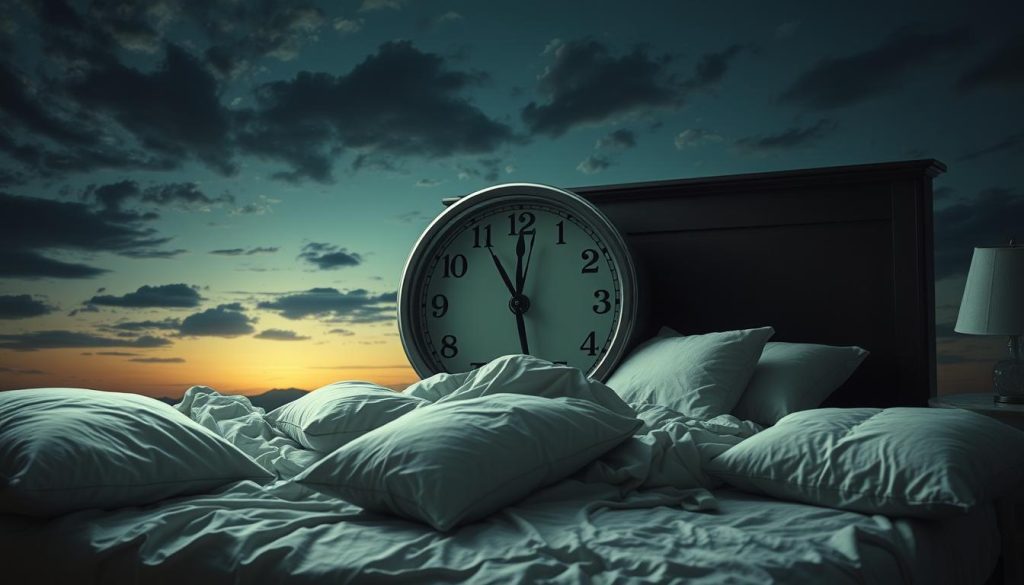
Medical Evaluations
Doctors might do blood tests, check hormone levels, and conduct sleep studies. They also ask about daily habits and do a physical exam. This helps find signs of depression or thyroid problems.
Many doctors follow guidelines from places like the Centers for Disease Control and Prevention (CDC). This helps them figure out complex cases.
Keep a Sleep Diary
Writing down when you go to bed, wake up, and how you feel in the morning can be very helpful. It can show if you have trouble sleeping or weird dreams. This information helps doctors understand what’s going on with your sleep.
Keeping a sleep diary also shows how things change over time. It helps doctors create plans to help you sleep better at night.
Treatment Options for Relief
Following a daily routine that respects your body’s natural rhythm can help you sleep better. If you find yourself wide awake at night or tired during the day, it might be due to a melatonin imbalance. Making small changes in your timing and exposure to light can help you get back on track.

Behavioral Therapies
Cognitive behavioral programs help you adjust your bedtime gradually. This method allows your body to adjust slowly, with changes in meal times and light exposure. Sticking to a consistent routine can help you maintain a stable sleep schedule.
Medication and Supplements
Some people find relief with prescription or over-the-counter aids. Melatonin supplements can help with a melatonin imbalance, but always use them as directed. Combining these with good sleep habits can lead to a healthier sleep cycle.
Natural Remedies for Circadian Rhythm Disorders
Changing your sleep schedule might seem hard, but small steps can make a big difference. For those with insomnia linked to circadian rhythm, small changes can help. Natural remedies often work well and avoid harsh side effects.
Light Therapy
Getting enough bright light in the morning can help your body clock. Devices like the Verilux HappyLight or Philips goLITE provide full-spectrum light. It’s important to use them at the right time to help your brain understand day and night.
Melatonin Usage
Many turn to melatonin to improve sleep. It helps the body relax and recognize when it’s time to sleep. Always talk to a doctor about how much to take and when. Adding calm activities like dimming lights and avoiding screens before bed also helps.
Lifestyle Changes to Improve Your Rhythm
Keeping a regular schedule can help your body’s internal clock. Small changes in your daily routine can lead to big improvements. Starting with a consistent bedtime is a good first step.
Many people find it helpful to have a calming routine before bed. This signals to your body that it’s time to sleep.
Creating a Sleep-Friendly Environment
A dark, quiet space is key for good sleep. Dim lights and quiet help your mind relax. Soft sheets, comfy pillows, and a supportive mattress make sleep better.
Blinds or curtains that block outside light are also important. They help keep your sleep area dark and peaceful.
Nutrition and Circadian Health
When you eat affects your internal clock. Eating big meals late can cause discomfort and slow digestion. Light snacks in the evening can help you sleep better.
While caffeine and sweets are okay during the day, avoid them before bed. They can disrupt your sleep rhythm.
| Lifestyle Change | Key Benefit | Tip |
|---|---|---|
| Steady Bedtime | Improved Sleep Consistency | Stick to the Same Hour |
| Dark Room | Fewer Light Disturbances | Use Blackout Curtains |
| Mindful Evening Meal | Less Overnight Discomfort | Eat Early and Light |
The Role of Technology in Circadian Health
Many people use devices all day, which can affect their sleep. Using technology wisely can help keep sleep cycles balanced. Turning off devices at night helps keep bedtime routines natural.
Apps can show patterns we miss in our busy lives. Paying attention to these signs can lead to better sleep and daily productivity.
Sleep Tracking Applications
Platforms like Fitbit and Apple Health give charts and alerts. They show sleep patterns, activity levels, and trends. Users learn how to improve their habits for better sleep.
Smart Lighting Solutions
Systems like Philips Hue and LIFX change light brightness and color at night. They mimic daylight to help the body relax. In the morning, they start with gentle light to wake you up. This helps keep sleep cycles regular.
| Tech Solution | Key Feature | Potential Benefit |
|—————|———————————–|—————————————————–|
| Fitbit app | Adaptive sleep tracking | Identifies irregular patterns for better awareness |
| Philips Hue | Auto-dimming and sunrise settings | Encourages smoother sleep-wake transitions |
| Apple Health | Integrated data from multiple apps| Provides holistic view of daily habits |
Seeking Professional Help
If you’re having trouble with your internal clock, you might need help from a pro. A trained expert can spot patterns that home remedies can’t. Many people find that getting professional advice helps them understand their sleep issues better.
Specialized clinics offer tailored plans and analysis. They use monitored therapies to fix long-term sleep problems. This can help you get back on track and find balance.
When to Consult a Specialist
Feeling groggy in the morning might mean you need more help. It’s a sign of a bigger problem. Seeing a sleep doctor can help figure out if you need medical help or just need to change your habits.
Types of Healthcare Providers to Consider
There are many experts who can help you with your sleep. The right one depends on your specific situation and symptoms. Here’s a quick guide:
| Provider Type | Focus Area |
|---|---|
| Sleep Medicine Specialist | Advanced testing and treatments for circadian irregularities |
| Neurologist | In-depth brain function evaluations affecting sleep cycles |
| Psychologist | Therapy for stress and behavioral triggers linked to sleep disorders |
Success Stories and Personal Experiences
Many people in the United States have improved their sleep-wake cycles. They used therapy, medication, and technology to do so. Their stories show how simple habits can help with sleep disorders.
Real-Life Examples of Transformation
In California, a working professional used melatonin and light therapy to feel more awake in the morning. A student at Stanford Sleep Medicine Center changed their bedtime by half an hour and cut down on screen time at night. A shift worker made small changes like taking breaks and stretching during shifts.
These stories show how making focused changes can make a big difference.
Lessons Learned from Circadian Rhythm Recovery
Being patient and trying different things often leads to the best results. Finding out what disrupts your sleep, like caffeine or eating at odd times, helps. Adding relaxing evening activities and avoiding harsh lights can also help.
Using apps to track your progress can keep you on track. With the right approach, better sleep and more energy during the day are possible.

